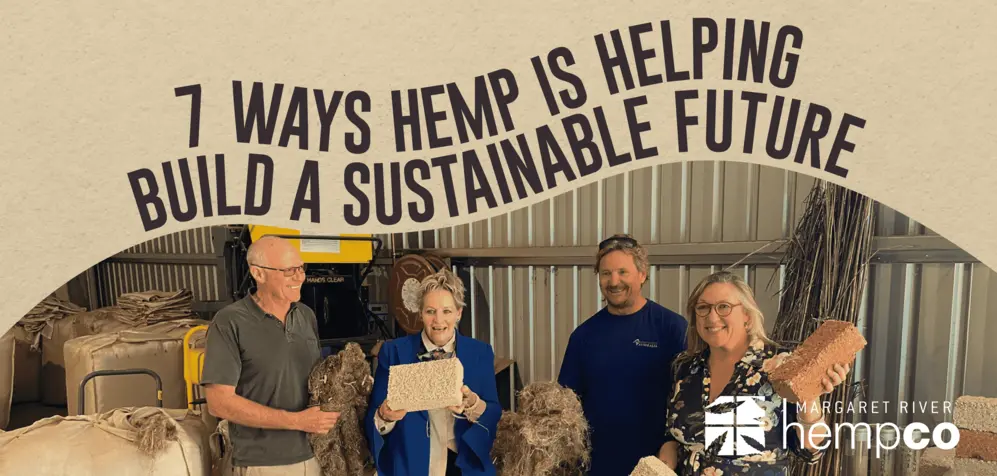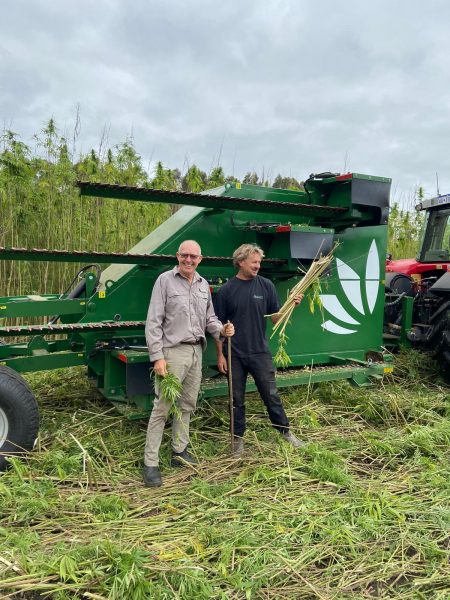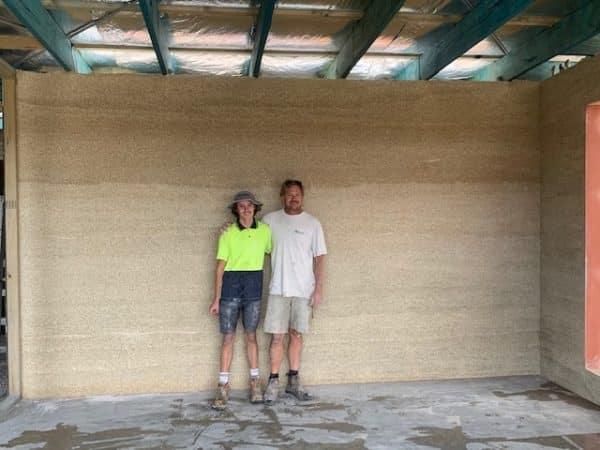
Today we are covering the different uses of Industrial Hemp;
From concrete to plastics and even food!
Not to mention the fact that it can replace several products from trees, which could have a huge impact on deforestation!
This sustainable wonder crop is coming through with eco-friendly alternatives which are taking the world by storm!
Grown all around the world for well over 10,000 years, hemp is showing promise in helping us move away from non-renewable resources.
Here are our favourite 7 ways hemp is helping build a sustainable future;



Hempcrete can be used to make carbon positive buildings that absorb and store carbon dioxide throughout their lifetime, contributing to sustainability by removing greenhouse gasses from the atmosphere.
The combination of hemp hurds, water, and lime can be used in various roles in the construction process. You may find it mixed in insulation, flooring, press-board, and walls due to the remarkable thermal properties of the fibres. Other properties include fire, insect, and mould resistance.
Isn’t it interesting how the characteristics of hemp fibre naturally roll over to the products we turn them into?
Hemp can contribute to sustainability by offering a realistic substitute for plastic. Back in the 1940s, Henry Ford included hemp (among other natural fibres) in the mix for the composite he used for the body of a concept car.
This concept was somewhat lost in history…. However, in 2008, Lotus released the ‘Eco Elise’, a green production car with a body made of sustainable hemp bioplastic.
Top Gear Review of the Eco Elise
Since then, other car manufacturers have reintroduced hemp to their vehicles. You can now find hemp used in door panels, columns, seat backs, boot linings, floor consoles, and instrument panels.
Hemp isn’t just ‘more sustainable’, but also stronger, lighter, and cheaper than carbon fibre - so it’s a no brainer, really!
Hemp plastic makes a great bio-degradable option that helps keep trash out of our oceans! However, according to the British Plastics Federation; only 4-6% of global fossil-fuel expenditure goes towards manufacturing plastic…
That’s why the next topic we want to talk about how hemp biofuels could provide us with a more sustainable means of transportation.
We’ll keep it simple...
Hemp can be turned into a few types of fuel, but biodiesel is by far the most commercially viable option. A study done by the University of UCONN has shown that you wouldn’t even need to convert your engine to run a car on pure hemp biodiesel.
The same study found that for every 1L of hemp oil converted, 97% was retained as usable biodiesel - That’s only a 3% loss in volume! Not only does it burn with 75% fewer particles, but it can run at a lower temperature.
The ability to use hemp biodiesel could drastically reduce the average driver's carbon footprint.
Hemp offers a sustainable alternative to anything made from cotton. In fact, before the 1920s, it’s said that up to 80% of the world's clothing was made from hemp.
The demonisation of ‘Marijuana’ (the slang term for high-THC female cannabis) led to a halt in the commercial hemp industry. This resulted in public preference swinging towards cotton, and then eventually synthetic textiles.
Hemp fabric comes in a variety of styles and is stronger, longer-lasting, and much less resource-hungry than cotton. To grow 1kg of usable hemp fibre, you need half as much land, and around ¼ of the water as 1kg of cotton… and that’s not even taking pesticides into account yet.
That’s why we’re trying to help bring hemp clothing back into fashion…You can see our available range Here.
For years now, deforestation has been a top environmental issue, and hemp can be looked at as a sustainable solution to products that require trees, such as wood and paper.
In fact, hemp is one of the first resources humans ever used to make paper... And it’s been going on for at least 2000 years.
There have been some monumental points in history recorded on hemp paper; From the draft of the declaration of independence to the signing of the 2018 farm bill… hemp paper can be found in significant moments throughout history.
As demand for hemp pulp increases as more companies look to incorporate it in their products, the economy of scale should reduce the production costs making it a more economically viable option.
Considering it already has superior strength and durability and is much easier to recycle, it will be tough to contend with…
This simple change from wood pulp to hemp pulp being used to make paper would see fewer chemicals contaminating our waterways!
An acre of hemp also produces around 3x as much paper as an acre of trees, which isn’t too bad for a 3-5 month turnover.
If the amazing products made from hemp that help us live more sustainable lives wasn’t enough for you, we’re about to dive into how growing hemp can literally help restore balance to our ecosystem.
As we said before, hemp uses less water than most other crops commonly grown for commercial resources. Due to its resilience, it has also been flagged as a plant we can use to clean up the environment.
Through a process called phytoremediation, hemp can be used to clear toxic waste, heavy metals, and other contaminants from polluted soil.
One of the most notable uses of this was after the nuclear meltdown at Chernobyl when a company called Phytotech attempted to use hemp to remove radiation from the ground.
A more recent case of this was in Italy when a farmer near an old steel mill successfully saved his land from dioxin pollution by growing hemp. That means hemp takes it one step further than sustainability, and should actually be looked at as a tool for regenerative agriculture.
Last but not least, hemp supports sustainable lifestyles by catering to the needs of those with strict dietary standards. But it’s not just for vegans… hemp seed should be a staple of everyone's diet. Also known as ‘hemp hearts’, they are starting to be used in a variety of healthy foods such as;
It’s no wonder that hemp seed has claimed ‘superfood’ status in the world of health & wellness. You can read more about the health benefits of hemp seed here!
With everything you know now, would you make the change to help in your efforts to reduce your carbon footprint? We know we are!
If you want to know more about hemp and sustainability or have a specific question, please get in touch over our social media! We’d love to hear from you.